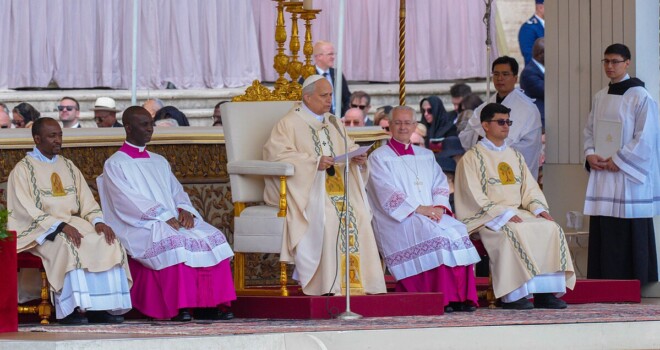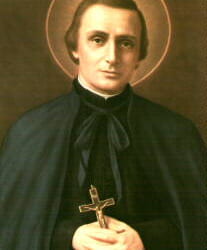I remember the first time I held one of Don Dolindo Ruotolo’s writings in my hands. The yellowed pages carried the scent of history, but the words—oh, the words were alive with a timeless fire that seemed to leap from the page directly into my heart. There was something about his humble yet profound way of expressing the deepest truths of our faith that felt like a gentle hand guiding me back to what really matters.
On May 14th, 2025, as I listened to our Holy Father Pope Leo XIV address the participants in the Jubilee of Oriental Churches, I experienced that same stirring in my soul. “The Church needs you,” the pope declared to our Eastern brothers and sisters. “The contribution that the Christian East can offer us today is immense!”
In his address, Pope Leo XIV made a powerful appeal that caught my attention:
It is likewise important to rediscover, especially in the Christian West, a sense of the primacy of God, the importance of mystagogy and the values so typical of Eastern spirituality: constant intercession, penance, fasting, and weeping for one’s own sins and for those of all humanity (penthos)! (Address, 2025)
These words struck me like a bell ringing through a silent valley. How often in our busy Western lives do we allow the “primacy of God” to be overshadowed by the primacy of our schedules, our comforts, our technologies?
Decades before this papal address, Don Dolindo Ruotolo had already diagnosed this spiritual illness of the modern world with remarkable precision:
To know, love, and serve God is not some negligible appendix to the book of human life—it is its center. It is not the timid occupation of small-minded people, but the glorious life of the strong. It is not some fanciful diversion or poetic refuge in times of anguish, but true elevation and greatness. (Commentary on Chapter 34 of Ecclesiasticus)
Pope Leo XIV’s appeal to preserve Eastern traditions “without attenuating them” speaks to a spiritual richness that the West desperately needs. In his commentary on Chapter 12 of the Letter to the Romans, Don Dolindo describes the Christian’s dedication to God:
It is a total orientation that admits no half-measures and condemns any acquiescence to the spirit of the world. It is the Christian’s complete dedication to God as a victim of love in his very bodily life, a perfect union with His will, and a constant striving toward greater perfection. (Commentary on Chapter 12 of the Letter to the Romans)
I find myself wondering: is this not precisely what our Holy Father is calling us back to? This “total orientation” is the lived spirituality of our Eastern brothers and sisters, who have preserved in their liturgies and practices a sense of the all-encompassing nature of Christian dedication.
When Pope Leo XIV specifically mentioned “constant intercession, penance, fasting, and weeping for one’s own sins and for those of all humanity,” I couldn’t help but think of how these practices have been marginalized in much of Western Christianity. We have become uncomfortable with the language of sacrifice, with the concept of penance, with the spiritual discipline of fasting.
Don Dolindo spoke of these practices with conviction and clarity:
The Church prohibits eating meat on Friday, in honor of the Passion of Jesus Christ, and on days of fasting for salutary penance. These are holy and most praiseworthy practices, ridiculed or violated only by those who abdicate their reason and their love. Those who remember that on Friday the Blood of Jesus Christ was shed for our salvation, unable to give their own blood in thanksgiving, at least offer Him the homage of deprivation. (Commentary on Genesis, Chapter 9)
There is something deeply moving about this perspective, which sees our small acts of self-denial not as burdensome obligations but as intimate gestures of love toward the One who gave everything for us.
Don Dolindo goes further in his commentary on the Acts of the Apostles:
It was in prayer and fasting that the Holy Spirit manifested Himself . . . We, instead, prefer to rely on the devices of human prudence and political resources, and we disregard the light of the Holy Spirit so much that it seems almost like a caricature to resort to prayer when action is needed, and nearly foolish to turn to penance. (Commentary on Chapter 13)
How these words resonate today! We have indeed become a people who find “even the mildest ecclesiastical fast unbearable,” and who often place more faith in “human prudence and political resources” than in the transformative power of prayer and penance.
The Eastern concept of penthos—that deep, spiritual sorrow for sin that Pope Leo XIV specifically mentioned—is beautifully articulated in Don Dolindo’s reflection on the Second Letter of St. Peter:
And who, when contradicted, betrayed, or condemned, could lose his way in the Christian or religious life while contemplating the suffering Jesus? Or who could desire the world, its riches, its revelries and its illusions, while contemplating Jesus born poor and living entirely for the Father’s glory? (Commentary on Chapter 4)
Another key element in Pope Leo XIV’s address was the importance of mystagogy—that sacred initiation into the mysteries of faith that embraces the experiential dimension of our relationship with God. Don Dolindo wrote:
The spiritual resurrection of souls does not lie in externalities, in associations, in pompous parades, or in all those forms of human activity that are more superficial than profound. Resurrection lies in the worship of God, offered to Him according to the laws He Himself has given—that is, primarily in the sacred Liturgy. (Commentary on Chapter 35 of Exodus)
Even more remarkably, in his commentary on Ezekiel, Don Dolindo seemed to prophetically envision the very renewal from the East that our Holy Father now explicitly calls for when he declared to the Oriental Churches: “The Church needs you. The contribution that the Christian East can offer us today is immense!” and affirmed them as “precious in God’s eyes.” Drawing on the biblical vision in Ezekiel 43:1-5, where the prophet sees the glory of God returning to the Temple through the eastern gate, Don Dolindo wrote:
In the restoration of Church life, God’s glory will return to the Temple, returning amid the very tumult of the punishment that will purify it, and in the splendor of the light of wisdom and love that will illuminate it. Life, previously entirely naturalized, will be transformed into activity for divine glory, and this transformation will occur when the Priesthood is sanctified. The renewal of life in God’s glory will come from the Eastern gate . . . (Commentary on Chapter 43)
How providential that nearly a century before Pope Leo XIV’s address to the Oriental Churches, Don Dolindo would write of renewal coming “from the Eastern gate”!
The final element I wish to highlight from Pope Leo XIV’s address is his mention of “constant intercession.” Don Dolindo’s writings reveal his deep appreciation for this dimension of Christian spirituality:
From the Romans, St. Paul asks for only one form of help: that of prayer . . . He wants only one assistance, the spiritual kind, and he implores them for it in the name of Jesus Christ and through the charity that the Holy Spirit has poured into their hearts. (Commentary on Chapter 15 of the letter to the Romans)
This vision of prayer as spiritual combat reminds us of the true efficacy of intercession. Don Dolindo reinforces this priority: “The common good is not achieved through idle talk, but by raising supplicating hands to God and imploring His mercy” (Commentary on Chapter 21 on the Gospel of St. Luke).
As I reflect on Pope Leo XIV’s recent address alongside Don Dolindo’s biblical commentaries, I feel a personal invitation that I want to extend to you, dear reader. Perhaps we are being called to embrace something of this Eastern spirituality that both Don Dolindo and our Holy Father have recognized as essential for the Church’s life.
Don Dolindo reminds us that authentic spirituality must transform us from within: “External works of piety and worship must be a reflection of the soul’s sentiments—they should be like flowers from a vigorous plant, harmonies from a delicate musical instrument, rays from a dazzling light, intense at its source” (Commentary on Chapter 35 of Ecclesiasticus).
The Holy Father’s plea that Eastern Churches preserve their traditions “without attenuating them, for the sake perhaps of practicality or convenience, lest they be corrupted by the mentality of consumerism and utilitarianism” is a call to all of us to resist the temptation to dilute our faith.
In our own time, we have witnessed the growing global devotion to a saint who perfectly embodied these Eastern spiritual values: St. Charbel Makhlouf. It seems providential that Pope Leo XIV was elected on May 8th, the very birthday of St. Charbel—a beautiful sign that perhaps points to the Holy Father’s special mission to highlight Eastern spirituality. This humble Lebanese monk exemplifies precisely what Pope Leo XIV meant when he declared to the Eastern Churches, “The Church needs you. The contribution that the Christian East can offer us today is immense!” and “You are precious in God’s eyes.”
In his hermitage on the mountainside of Annaya, St. Charbel lived the primacy of God with absolute dedication—spending hours in Eucharistic adoration, observing rigorous fasts, and maintaining an almost constant state of prayerful recollection. His life of penthos was not one of despair but of profound love and trust in Divine Mercy. The countless miracles attributed to his intercession remind us that a life devoted entirely to God, following the spiritual practices so treasured in Eastern Christianity, bears fruit not only for the individual soul but for the entire Body of Christ.
May we respond to this call with the same humility and fervor that characterized Don Dolindo’s life and writings, trusting that in returning to these timeless practices, we will find not constraints but the liberating embrace of God’s love.
May the intercession of Our Lady, St. Charbel, Don Dolindo, and all the saints of East and West accompany us on this journey of rediscovery.
Maria Regina Cordium, ora pro nobis!
Author’s Note: If you would like to read more about Don Dolindo’s spirituality, check out this book: Don Dolindo’s Spiritual Guidance.
Image from Wikimedia Commons
Ruotolo, D. D. (1939). Commento alla Sacra Scrittura. Apostolato Stampa, 33.














